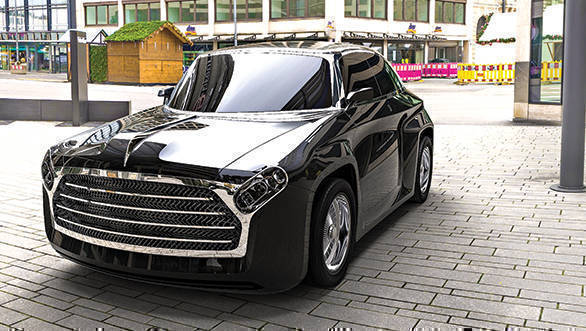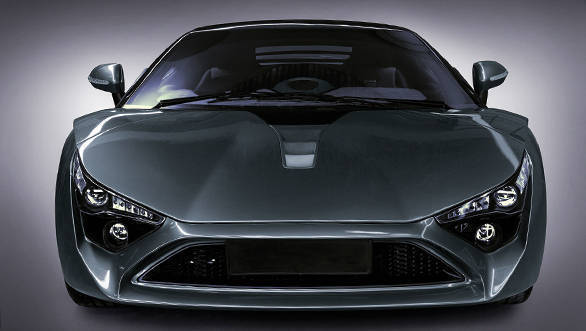DC2 e-Amby arrives in India in 2022: Here's everything that you should know
The Hindustan Motors Ambassador is one of the most popular automobile icons, having been on sale for close to six decades in India. From its characteristic rugged design, acres of cabin space, or its workhorse of a powertrain, the Ambassador commanded a different status among the available options then. It is believed to be making a comeback in a new-generation avatar from the new owners of the marque. However, this feature is instead about how the 'national car of India' has inspired boutique car manufacturer Dilip Chhabria to reimagine it as an electric vehicle in the form of the e-Amby.

Chhabria's fascination with the mighty Ambassador dates back to 1998 when he conceptualised the Phoenix - a modern take on the '60s design of the Ambassador 1800 ISZ, which not only boasted an advanced design but was also 55-60kg lighter than the original. The retro-yet- futuristic Ambierod came next, which took its hot-rod styling from
the GM Holden Efijy concept and was powered by a V12 engine. So, what's with DC's fixation with the Ambassador?
"It is the car that motorised the country post-Independence and represented the true values of the country. The Ambassador has always been a crucial aspect of the identity of free India. It was always seen as a national car and we wanted to elevate it to a level that can be taken across the world. We also wanted to make it more suitable for politicians to use, in comparison to cars from other brands," explains Chhabria.

The Rs 120 crore e-Amby project is DC's second from-scratch model after the Avanti, India's own supercar, which put out an impressive 310PS from a Renault 2-litre turbocharged petrol engine. What were the learnings from the Avanti that benefited the e-Amby? Chhabria mentions, "Back then (2012), the regulatory authorities didn't expect a supercar from India. They didn't have the tracks where they could test the performance and braking of the car and yet we were supposed to comply with them. Sometimes they had a rule that each car should have a spare tyre. Now no supercar has a spare tyre. So we had to go back to the drawing board and make a design to accommodate a spare tyre in the Avanti. The learning with the Avanti was, before you start anything, make sure you know everything about the regulation and the facilities that are available in the country. You cannot just take them on face value as there was an instance when the wheels had to be homologated since they were from China, so Indian regulators flew down to China to test the wheels according to Indian norms. The other learning was from the vendors. In 2012, when we asked the vendors to source developed parts that were not used by other customers, they had agreed. However, once the prototype was ready, some of these vendors backed out giving excuses of development costs. We then had to make do with our own drawings or capitulate with whatever they were asking for. All these were great learnings as now we know the suppliers who are ethical, and who are not."
Chhabria's company, DC2 Designs, has worked on the e-Amby project for 18-20 months, starting from scratch to making the final prototype. In fact, the Avanti took 33 months from sketch to homologation and delivery to customers, which was even faster. The images of the e-Amby that you see in this feature are engineered drawings, which means this is as close to the real deal as possible and there will be no change in the aesthetics of the car. Chhabria says that the idea behind the design of the e-Amby, was to ensure that the DNA of the Ambassador is maintained, and for it to look like it has evolved over eight or nine generations - like the Volkswagen Golf and the Porsche 911.
The characteristic lines on the bonnet, bulge on the rear, and the curves, are reminiscent of the Ambassador with the roundish organic look, now squarishly streamlined. It does not get a very steeply raked A-pillar but still has a contoured windscreen. DC2 will be offering gullwing doors on the e-Amby, and will have a similar form and opening mechanism like those on the Ambierod concept. However, there are challenges related to the stiffness of the body with these doors, which DC's team is working on. In terms of dimensions, the e-Amby will be 200mm longer, 100mm wider and 50mm taller than the Ambassador.
While the exact specifications are still not out, Chhabria confirms that the e-Amby will be offered
with a 160kWh battery pack and is expected to have a driving range of 190-200km on a single charge. A full recharge should take between five to six hours, but fast charging won't be an option. The highlight, however, will be the e-Amby's 0-100kmph acceleration, which Chhabria claims to be in the range of 4-5.5s or lower. That's similar to what Audi claims for the e-tron SUV, for example. The complete electric powertrain is being sourced by turnkey integrators based out of Switzerland, the battery pack and some of the key components will be from China, while the electric motor will be from Germany. The e-Amby is expected to have 45 per cent localisation.
DC2 Designs will be targeting international countries like the USA, UK, some countries of the Middle East, Singapore and Malaysia which have a large concentration of Indians. Further, Chhabria believes that even international audiences will connect with the e-Amby, because of the heritage of the Ambassador identity, and its uniqueness compared to other offerings in the market. His company is planning to sell a total of 5,000 units of the e-Amby annually, catering to both domestic and the international markets.
DC2 Designs will be tying up with government agencies and oil companies as far as setting up a charging network goes, as having its own network for a product with such niche numbers won't be viable. The e-Amby will be launched in Delhi, Bengaluru and Mumbai first. DC2 Designs is also planning to start support operations in the south of India, which will be functional by the time e-Amby arrives. While the initial plan was to launch the e-Amby by the end of next year, it is now expected to arrive in 2022. As Chhabria explained, even though the technical aspects of the car are largely in place, the pandemic has brought in a shift in investment appetites. Chhabria is hoping to bank on the GST benefit on electric cars and price the e-Amby in the range of Rs 40-45 lakh, ex-showroom.